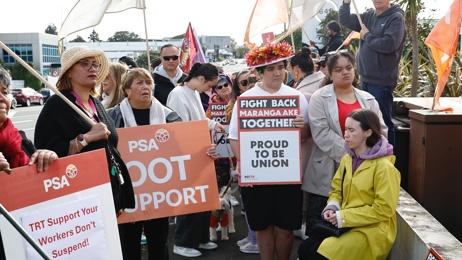
Take a day off next week as a way to ease back to work and start booking future leave to give yourself something to look forward two.
These are two ways an Auckland family doctor says can help people cope with that miserable feeling about having to return to the office.
Those lazy, hazy, crazy days of summer will be turning into a season of post-holiday blues for many, as thousands of Kiwis return to work on Monday.
With many businesses and employers already adopting a “living with Covid” attitude, that would mean getting back to offices for many.
Dr Luke Wee, a GP from Meadowbank Medical Centre, says he sees quite a few patients who had feelings of low mood and sadness about having to go back to work.
“Over Christmas, some people have had an overindulgence of food and drink, parties, short holidays and this realisation that these are coming to the end can bring about low mood and anxiety - especially if they are working in a job that doesn’t bring them joy,” Wee said.
He said others may have encountered family feuds or even a sense that another year is over and they “hadn’t achieved enough”.
/cloudfront-ap-southeast-2.images.arcpublishing.com/nzme/LSXQ7LBUOVB5XISMXNNOVLPKLU.jpg)
Dr Luke Wee. Photo / NZME
“New year often brings about new hope, but these are often false hopes with many people making resolutions that are impossible to keep,” Wee said.
“It is far better for people to make realistic plans, perhaps planning out the year with fun things and healthy habits rather than resolutions that don’t work.
“If you set goals that are not achievable and you’re fixated on them, then you’re just going to feel depressed at the end of the year.”
Wee, a Fellow of the NZ College of GPs, said “mindfulness” - the state of focusing on the present moment but not judging something as being good or bad - was a good method to help survive the January blues too.
“You accept the situation that you are in, and so you can cope better. If you attach too much emotion to the things around you then you will always be unhappy,” he said.
To beat the miserable back-to-work feeling, Wee said people should spend a day or two before they return to the office to get rested, exercise, and do some personal admin to mentally prepare themselves.
Also, if it was possible, take the first Friday of the work week off.
“There is some evidence that a four-day week is actually better for employee wellbeing,” Wee said.
“But even if you’re on a five-day week then taking one day off on the first work week of the year makes it a more bearable prospect to ease you back to the daily grind.”
Wee said people should also book future leave dates on the first day they get to the office.
“It gives you something to look forward to and makes it easier to accept the fact of being back at work,” he said.
Even if people had the option of working from home, Wee suggested people should go back to the office if they can.
“Being around colleagues who are also returning to work after the holidays might also energise them, and make them feel they are not alone in this,” Wee said.
If they are still feeling down a week or two after returning to work, then Wee suggested they should seek help from their GP or self-refer themselves to counselling services, many of which are free.
Shaun Robinson, of the Mental Health Foundation. Photo / Supplied
Mental Health Foundation chief executive Shaun Robinson said holidays were a “great and necessary chance to relax, unwind and reset” and it was natural to feel a bit low when they were over.
“But the back-to-work blues are avoidable,” he said.
Robinson said the new year should be taken as an opportunity to commit to improving mental health and to work actively to ensure coming to work was an enjoyable and supportive experience for all.
“The benefits of improving workplace mental health extend beyond individuals, they reach into our whanau and communities too,” he said.
The foundation has a free “Five Ways to Wellbeing” toolkit resource which helps make it easier for employees to return to work, and for employers to create better work environments.
The five steps are: connect, give, take notice, be active and keep learning, and Robinson encouraged people to find ways to incorporate these into their day.
“Block out at least 15 minutes a day for you to do something you enjoy, take advantage of the lighter evenings and plan fun activities,” he said.
“Get organised - you’ll feel less stressed if take some time to plan your day and week ahead.”
Robinson said while it is not uncommon to feel low when people first get back to work, it’s not usual for this to continue.
Those who continued to feel this way for more than two weeks for no apparent reason, then they should speak to a trained counsellor or GP.
Where to get help
If you are worried about your or someone else’s mental health, the best place to get help is your GP or local mental health provider. However, if you or someone else is in danger or endangering others, call police immediately on 111.
OR IF YOU NEED TO TALK TO SOMEONE ELSE:
- LIFELINE: 0800 543 354 or 09 5222 999 within Auckland (available 24/7)
- SUICIDE CRISIS HELPLINE: 0508 828 865 (0508 TAUTOKO) (available 24/7)
- YOUTHLINE: 0800 376 633 , free text 234 or email [email protected]or online chat.
- NEED TO TALK? Free call or text 1737 (available 24/7)
- KIDSLINE: 0800 543 754 (available 24/7)
- WHATSUP: 0800 942 8787 (1pm to 11pm)
- DEPRESSION HELPLINE: 0800 111 757
- SAMARITANS – 0800 726 666
Take your Radio, Podcasts and Music with you

/cloudfront-ap-southeast-2.images.arcpublishing.com/nzme/IOE5MXOEVVAPPGLAZO5RG2OHBQ.JPG)








